Whoops, my bad. I thought Sancho was Catalan when I first looked at his profile, but he's Castillian. His wife, Gotlana, is Catalan, though...

The Legacy of Durham - County of Durham, 1066
- Thread starter Revan86
- Start date
-
We have updated our Community Code of Conduct. Please read through the new rules for the forum that are an integral part of Paradox Interactive’s User Agreement.
You are using an out of date browser. It may not display this or other websites correctly.
You should upgrade or use an alternative browser.
You should upgrade or use an alternative browser.
stnylan said:Ulster a good and prosperous territory? He's been eating too many mushrooms if you ask me! Though the prestige would be a good thing.
Yeah, I guess that's stretching it a little far. York would be a better bet, although a little harder a war to pull off...
VII. Murchadh’s Treachery
Saewald fumed in his seat as Aelle Percy paced about nervously before his table. This debacle had bankrupted him and weakened him in the eyes of Eochaid King. Aelflaed was not speaking to him because of it, that’s how badly he’d failed. His army hadn’t lost a single battle, but they’d most definitely lost this war, in every other way possible.
‘How could this have happened?’ Saewald roared. ‘We had beaten Ulaid soundly!’
‘I know that, my lord,’ the elder marshal told him patiently.
‘We had Ulster in our grasp! It was bad enough when Eochaid King’s generals decided they would take control of the war effort, but… Christ’s blood, what treachery!’
‘My lord! Mind your tongue!’ Aelle, though a hardened soldier and a good tactician, was still quite pious and did not take kindly to the oaths the young and headstrong Saewald was wont to use.
‘Devil take that opportunistic worm Murchadh! Our armies fought and bled and died in the field against the warriors of Ulaid, yet his fresh-faced minions take the cities and holed themselves up in like the miserable recreants they are! We wasted so much money and so many lives, and we have nothing to show for it.’
‘A cowardly tactic,’ Aelle agreed. ‘But they won it nonetheless.’
‘And now he has the gall to proclaim himself Duke of Ulster and then, to add insult to injury, offer his hand in alliance!’ Saewald spat. ‘I tell you, my lady won’t sleep with me because of how Murchadh of Tir Connaill has humiliated me! I swear, he shall receive his comeuppance.’
‘Perhaps the sooner we strike, the better, my lord,’ Aelle told him. ‘We didn’t lose overly many soldiers to the attack on Ulaid, and we pulled them out as soon as Eochaid signed a truce. Perhaps this is the time to take initiative. Their forces still pose little threat in number, and they are more spread out than they were when Murchadh’s writ ran only in Tir Connaill. If we move before they can recover, we can take not only Tir Connaill, but also Ulaid and Tir Eogain as well. The Duchy of Ulster, I promise, shall fall before us,’ Aelle finished grimly.
‘I’ll have that promise, Percy.’ Saewald growled. ‘This time, we must not fail.’
In February of 1118, Duke Saewald of Durham and Aelle Percy amassed all the forces in Berwick, Northumberland and Durham and prepared them to cross the Irish Sea before declaring war on the Duchy of Ulster. Though the King of Scotland lent his support, this war was carried out swiftly and with punishing force almost entirely by Duke Saewald’s forces: Ulaid fell quickly before Saxon swords, then Tir Eogain. Aelle Percy demonstrated great prowess in the battle for Tir Eogain by using siege ladders to effect, and the county was taken quickly. Murchadh, all his forces beaten and with nowhere left to run, capitulated completely to Duke Saewald and was stripped of all his titles. The Duchy of Ulster had come to an end, and those territories were now in the control of the Duchy of Berwick.
The taste of vengeance was a bittersweet one, however, and Berwick had paid for it dearly. Berwick’s treasury was completely bankrupted, and he ended up so indebted to his vassals that Durham’s fishery had to be dismantled to pay off a portion of it. On the other hand, Aelflaed de Bohun’s Norman pride having been salved with Berwick’s victory over Ulster, she returned enthusiastically to her husband’s bed, and it wasn’t long before she was again with child. Also, the Ulster counties were added to Saewald’s demesne, and were beginning to pay off all the riches they had cost.
Saewald fumed in his seat as Aelle Percy paced about nervously before his table. This debacle had bankrupted him and weakened him in the eyes of Eochaid King. Aelflaed was not speaking to him because of it, that’s how badly he’d failed. His army hadn’t lost a single battle, but they’d most definitely lost this war, in every other way possible.
‘How could this have happened?’ Saewald roared. ‘We had beaten Ulaid soundly!’
‘I know that, my lord,’ the elder marshal told him patiently.
‘We had Ulster in our grasp! It was bad enough when Eochaid King’s generals decided they would take control of the war effort, but… Christ’s blood, what treachery!’
‘My lord! Mind your tongue!’ Aelle, though a hardened soldier and a good tactician, was still quite pious and did not take kindly to the oaths the young and headstrong Saewald was wont to use.
‘Devil take that opportunistic worm Murchadh! Our armies fought and bled and died in the field against the warriors of Ulaid, yet his fresh-faced minions take the cities and holed themselves up in like the miserable recreants they are! We wasted so much money and so many lives, and we have nothing to show for it.’
‘A cowardly tactic,’ Aelle agreed. ‘But they won it nonetheless.’
‘And now he has the gall to proclaim himself Duke of Ulster and then, to add insult to injury, offer his hand in alliance!’ Saewald spat. ‘I tell you, my lady won’t sleep with me because of how Murchadh of Tir Connaill has humiliated me! I swear, he shall receive his comeuppance.’
‘Perhaps the sooner we strike, the better, my lord,’ Aelle told him. ‘We didn’t lose overly many soldiers to the attack on Ulaid, and we pulled them out as soon as Eochaid signed a truce. Perhaps this is the time to take initiative. Their forces still pose little threat in number, and they are more spread out than they were when Murchadh’s writ ran only in Tir Connaill. If we move before they can recover, we can take not only Tir Connaill, but also Ulaid and Tir Eogain as well. The Duchy of Ulster, I promise, shall fall before us,’ Aelle finished grimly.
‘I’ll have that promise, Percy.’ Saewald growled. ‘This time, we must not fail.’
In February of 1118, Duke Saewald of Durham and Aelle Percy amassed all the forces in Berwick, Northumberland and Durham and prepared them to cross the Irish Sea before declaring war on the Duchy of Ulster. Though the King of Scotland lent his support, this war was carried out swiftly and with punishing force almost entirely by Duke Saewald’s forces: Ulaid fell quickly before Saxon swords, then Tir Eogain. Aelle Percy demonstrated great prowess in the battle for Tir Eogain by using siege ladders to effect, and the county was taken quickly. Murchadh, all his forces beaten and with nowhere left to run, capitulated completely to Duke Saewald and was stripped of all his titles. The Duchy of Ulster had come to an end, and those territories were now in the control of the Duchy of Berwick.
The taste of vengeance was a bittersweet one, however, and Berwick had paid for it dearly. Berwick’s treasury was completely bankrupted, and he ended up so indebted to his vassals that Durham’s fishery had to be dismantled to pay off a portion of it. On the other hand, Aelflaed de Bohun’s Norman pride having been salved with Berwick’s victory over Ulster, she returned enthusiastically to her husband’s bed, and it wasn’t long before she was again with child. Also, the Ulster counties were added to Saewald’s demesne, and were beginning to pay off all the riches they had cost.
VIII. The Gamble
In the summer of the Year of our Lord 1123, Saewald Duke of Berwick and Ulster listened with chagrin in Eochaid’s court as he heard from various messengers about how the Saracens had begun to take most of Spain and seep into Italy. The Consul of Venice, Louis d’Anjou, bore his request for a Crusade against the heathen invaders to the King of the Scots. Eochaid King was more concerned, however, with the safety and well-being of his own realm, and refused his aid.
Saewald, however, kept half an ear trained on Venetian affairs. When he heard at last that the Saracens of Caceres had completely done away with the Consulate and that the Sheikh of southern Spain had taken direct control, Saewald decided he would make a gamble with his troops and with his money, and embark on this crusade to free the Venetians.
‘This is a noble and pious thing you’re doing, my lord,’ Aelle Percy told him, ‘but should we not first take account of our own situation? We’re across a sea and a mountain range from Venice! What you’re considering would bankrupt us thrice as badly as the Ulster wars!’
‘Noble and pious, eh?’ Saewald rubbed his clean-shaven chin. ‘Don’t think either nobility or piety has much to do with it in my own case. If God truly is looking down on us He certainly wouldn’t be bothering to help out a reprobate like me. But Venice is a major centre of trade, and if we can free it from the Saracens’ grasp, we would be in control of a major source of wealth and power. Ulster paid for itself; Venice will pay for itself tenfold.’
‘It’s a terrible gamble, my lord: we must not so casually dismiss the Saracens’ strength. Now that they control Venice, they can equip and feed an army of twelve thousand – half as large again as anything we can muster.’
‘True. Which is why we won’t declare war upon them until we’re at their doorstep, in Tirol. God may be on our side, but I’d also feel more comfortable with the element of surprise.’
Aelle Percy chuckled. ‘Remembering Ulster, are we, my lord?’
‘Remembering Aelflaed’s face after I returned from Ulster, more like,’ Saewald grinned.
For staking their lives on such a chance, Saewald’s vassals and soldiers seemed enthusiastic for this crusade. A few regiments from Ulster would join them later outside Venice, though when they did descend out of the Alps most of the regiments did arrive intact. They stood in Trent while the messenger from Durham arrived in Cereces with the declaration of war. The timing was vital. When word reached Trent that the Saracen messenger from Cereces had reached Venice, Berwick’s army marched on Venice and launched its attack in a field outside Mestre.
The armies were evenly matched, with Saewald’s seven thousand on the one side and the Saracens’ six thousand on the other. But the Saracens’ recruits were bewildered by the sudden attack, and the Berwick men were confident in their ability to win utterly. Combined with Saewald’s and Percy’s inspired tactics, the Saracen lines broke quickly. Soon the Saracen army had been completely routed and the gleaming, silver canal-laced city lay before them, the most beautiful sight any of them had ever seen. As Saewald gazed upon Venice, he mused that he would have so much to tell Aelflaed and his son Oswiu about it when he returned.
The gamble had been won. Saewald breathed a sigh of relief, knowing that now Venice was taken, there could be nothing more terrible the heathen could throw in his direction. As the gates of Venice beckoned, he could almost feel that God had been watching them. Almost.
In the summer of the Year of our Lord 1123, Saewald Duke of Berwick and Ulster listened with chagrin in Eochaid’s court as he heard from various messengers about how the Saracens had begun to take most of Spain and seep into Italy. The Consul of Venice, Louis d’Anjou, bore his request for a Crusade against the heathen invaders to the King of the Scots. Eochaid King was more concerned, however, with the safety and well-being of his own realm, and refused his aid.
Saewald, however, kept half an ear trained on Venetian affairs. When he heard at last that the Saracens of Caceres had completely done away with the Consulate and that the Sheikh of southern Spain had taken direct control, Saewald decided he would make a gamble with his troops and with his money, and embark on this crusade to free the Venetians.
‘This is a noble and pious thing you’re doing, my lord,’ Aelle Percy told him, ‘but should we not first take account of our own situation? We’re across a sea and a mountain range from Venice! What you’re considering would bankrupt us thrice as badly as the Ulster wars!’
‘Noble and pious, eh?’ Saewald rubbed his clean-shaven chin. ‘Don’t think either nobility or piety has much to do with it in my own case. If God truly is looking down on us He certainly wouldn’t be bothering to help out a reprobate like me. But Venice is a major centre of trade, and if we can free it from the Saracens’ grasp, we would be in control of a major source of wealth and power. Ulster paid for itself; Venice will pay for itself tenfold.’
‘It’s a terrible gamble, my lord: we must not so casually dismiss the Saracens’ strength. Now that they control Venice, they can equip and feed an army of twelve thousand – half as large again as anything we can muster.’
‘True. Which is why we won’t declare war upon them until we’re at their doorstep, in Tirol. God may be on our side, but I’d also feel more comfortable with the element of surprise.’
Aelle Percy chuckled. ‘Remembering Ulster, are we, my lord?’
‘Remembering Aelflaed’s face after I returned from Ulster, more like,’ Saewald grinned.
For staking their lives on such a chance, Saewald’s vassals and soldiers seemed enthusiastic for this crusade. A few regiments from Ulster would join them later outside Venice, though when they did descend out of the Alps most of the regiments did arrive intact. They stood in Trent while the messenger from Durham arrived in Cereces with the declaration of war. The timing was vital. When word reached Trent that the Saracen messenger from Cereces had reached Venice, Berwick’s army marched on Venice and launched its attack in a field outside Mestre.
The armies were evenly matched, with Saewald’s seven thousand on the one side and the Saracens’ six thousand on the other. But the Saracens’ recruits were bewildered by the sudden attack, and the Berwick men were confident in their ability to win utterly. Combined with Saewald’s and Percy’s inspired tactics, the Saracen lines broke quickly. Soon the Saracen army had been completely routed and the gleaming, silver canal-laced city lay before them, the most beautiful sight any of them had ever seen. As Saewald gazed upon Venice, he mused that he would have so much to tell Aelflaed and his son Oswiu about it when he returned.
The gamble had been won. Saewald breathed a sigh of relief, knowing that now Venice was taken, there could be nothing more terrible the heathen could throw in his direction. As the gates of Venice beckoned, he could almost feel that God had been watching them. Almost.
Well Saewald's got an eye for rich counties, first Ulaid and then Venice.
Good work !
Good work !
IX. An Unscrupulous Hero of Chaos
In the years following Saewald’s costly conquest of Venice, Berwick had gone almost overnight from being a respectable if somewhat backwater Scottish duchy to one of the economic powerhouses of Europe. Venetian bezants flooded into Berwick’s treasury from that centre of trade, building everything from libraries throughout Ulster to castles in both Berwick and Durham. Saewald’s debt, numbering in the thousands of bezants, was paid for twice over by the profits the city brought him.
The situation in England was not so happy. The British Isles looked on in amazement when the English Civil War broke out, in the Year of our Lord 1130. Aldwulf Leofricson, the most powerful of the Saxon lords in England and the former lord of the Durham family, had declared himself King of the Saxon people and King of all England. Amazingly enough, Aldwulf had made himself fairly popular not only in the north but also among Norman nobles in the south, who had not approved in the first place of a King of England who could not speak English and even scorned speaking French in favour of Spanish.
Sancho de Normandie was taken completely by surprise as his nobles defected practically overnight to Aldwulf’s cause. Even his nobles in Normandy abandoned him, until he was left only with a few provinces in Catholic Mauretania, London, and Lincoln. Aldwulf King of England was crowned in late 1131, but no sooner had England been reunited under a Saxon ruler than several powerful duchies and earldoms declared their self-rule. The Duke of Lancaster in particular remained a force to be reckoned with, as had the Earls of Leicester and Derby. Soon, Aldwulf King found himself contending not only with the King of Mauretania on English soil, but also rogue nobles who had holed themselves up in their own lands, where no one’s writ ran but their own, and lawlessness ran rampant.
Saewald Duke of Berwick was once again extremely quick to take advantage of the situation. Finding them weak and friendless, Saewald laid claim to the titles of Leicester and Derby and quickly moved down into England with his armies. After a few minor battles, Saewald found himself with considerably greater English holdings, given the responsibility of restoring order in Northern England. Saewald the Younger, Saewald and Aelflaed’s first son, was given the Earldom of Leicester, while Wulfhere, their third, came into the Earldom of Derby. By 1140, Saewald had also taken the rogue Earldom of Hereford, and by 1145 Saewald Duke’s cousin Eardulf Earl of York had sworn fealty to his kinsman in favour of the new English King. In June of 1146, Saewald had defeated even the mighty Eormenric, the rogue Duke of Lancaster. Saewald was now Duke of Berwick, Ulster, York and Lancaster, and his writ now ran unbroken in one long swathe from the River Tweed in the Lowlands all the way down to Hereford in western England.
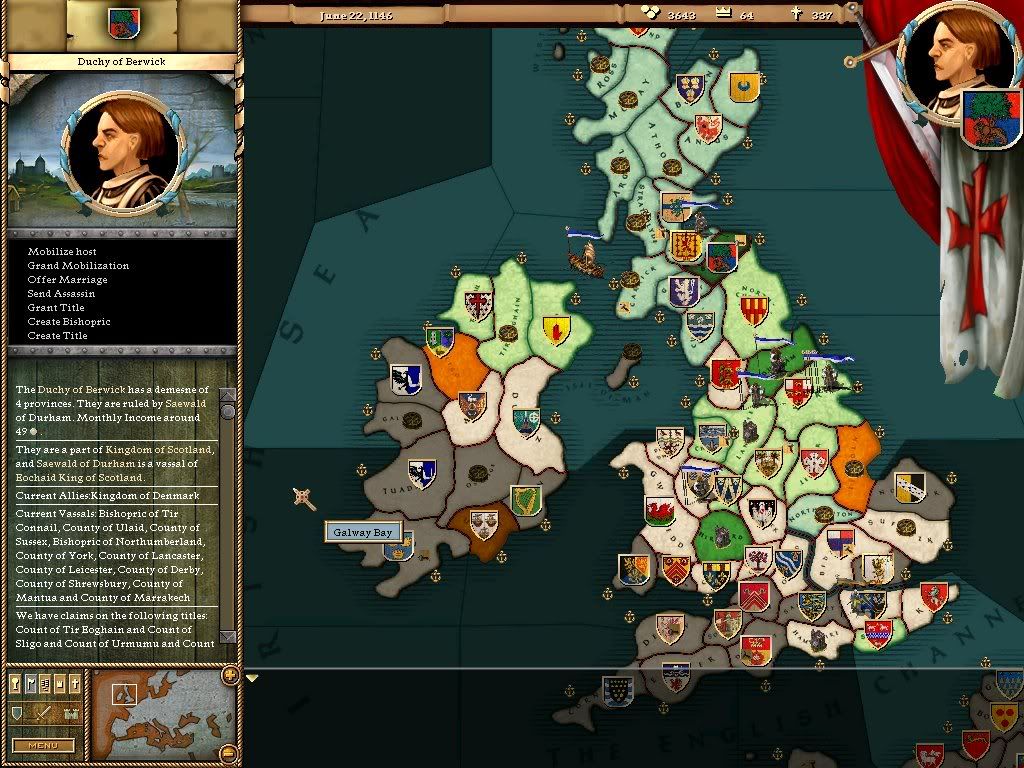
Saewald, known already as a capable statesman in times of peace, had made of himself in this time of chaos an unscrupulous hero. A wide swathe of England and Scotland now lay under his control – the makings of a new kingdom, Saewald mused. He had never been a man to set his sights low. Saewald had proven himself a worthy grandson and fought for the favours of his father and grandfather; he had married a lady of high birth, beauty and bravery, everything a man could desire; he had doubled – nay, tripled! – the spread of his rule, and increased manifold the prestige of the name of Durham. He had done in under thirty years what his grandfather could not have dreamed of doing in his lifetime.
And he would do yet more in this fractured, war-torn land. Three lords now vied for the Kingdom of England: Garcia de Normandie, grandson of Sancho and King of Mauretania, Talal Leofricson, the great-grandson of Aldwulf King of England, and himself. It seemed inevitable now that only one of them would eventually emerge victorious.
In the years following Saewald’s costly conquest of Venice, Berwick had gone almost overnight from being a respectable if somewhat backwater Scottish duchy to one of the economic powerhouses of Europe. Venetian bezants flooded into Berwick’s treasury from that centre of trade, building everything from libraries throughout Ulster to castles in both Berwick and Durham. Saewald’s debt, numbering in the thousands of bezants, was paid for twice over by the profits the city brought him.
The situation in England was not so happy. The British Isles looked on in amazement when the English Civil War broke out, in the Year of our Lord 1130. Aldwulf Leofricson, the most powerful of the Saxon lords in England and the former lord of the Durham family, had declared himself King of the Saxon people and King of all England. Amazingly enough, Aldwulf had made himself fairly popular not only in the north but also among Norman nobles in the south, who had not approved in the first place of a King of England who could not speak English and even scorned speaking French in favour of Spanish.
Sancho de Normandie was taken completely by surprise as his nobles defected practically overnight to Aldwulf’s cause. Even his nobles in Normandy abandoned him, until he was left only with a few provinces in Catholic Mauretania, London, and Lincoln. Aldwulf King of England was crowned in late 1131, but no sooner had England been reunited under a Saxon ruler than several powerful duchies and earldoms declared their self-rule. The Duke of Lancaster in particular remained a force to be reckoned with, as had the Earls of Leicester and Derby. Soon, Aldwulf King found himself contending not only with the King of Mauretania on English soil, but also rogue nobles who had holed themselves up in their own lands, where no one’s writ ran but their own, and lawlessness ran rampant.
Saewald Duke of Berwick was once again extremely quick to take advantage of the situation. Finding them weak and friendless, Saewald laid claim to the titles of Leicester and Derby and quickly moved down into England with his armies. After a few minor battles, Saewald found himself with considerably greater English holdings, given the responsibility of restoring order in Northern England. Saewald the Younger, Saewald and Aelflaed’s first son, was given the Earldom of Leicester, while Wulfhere, their third, came into the Earldom of Derby. By 1140, Saewald had also taken the rogue Earldom of Hereford, and by 1145 Saewald Duke’s cousin Eardulf Earl of York had sworn fealty to his kinsman in favour of the new English King. In June of 1146, Saewald had defeated even the mighty Eormenric, the rogue Duke of Lancaster. Saewald was now Duke of Berwick, Ulster, York and Lancaster, and his writ now ran unbroken in one long swathe from the River Tweed in the Lowlands all the way down to Hereford in western England.

Saewald, known already as a capable statesman in times of peace, had made of himself in this time of chaos an unscrupulous hero. A wide swathe of England and Scotland now lay under his control – the makings of a new kingdom, Saewald mused. He had never been a man to set his sights low. Saewald had proven himself a worthy grandson and fought for the favours of his father and grandfather; he had married a lady of high birth, beauty and bravery, everything a man could desire; he had doubled – nay, tripled! – the spread of his rule, and increased manifold the prestige of the name of Durham. He had done in under thirty years what his grandfather could not have dreamed of doing in his lifetime.
And he would do yet more in this fractured, war-torn land. Three lords now vied for the Kingdom of England: Garcia de Normandie, grandson of Sancho and King of Mauretania, Talal Leofricson, the great-grandson of Aldwulf King of England, and himself. It seemed inevitable now that only one of them would eventually emerge victorious.
Last edited:
Making good use of the opportunities. Quite a domain you've put together. It cannot be long surely before you are able to usurp the title.
stnylan said:Making good use of the opportunities. Quite a domain you've put together. It cannot be long surely before you are able to usurp the title.
There's the problem of prestige, though. Talal may be a rather weak king, but it still costs a lot to grab his title, and I think the rest of his nobles are too loyal to defect.
Also, sorry about the quality of the writing in these recent AAR posts. I've been playing this game a lot and the writing has been one long game of catch-up. I'll definitely be putting more effort into these next AARs.
Your writing is excellent.
The king of Mauretania rules in Essex, thos Normans seem to do about anything to stay king.
The king of Mauretania rules in Essex, thos Normans seem to do about anything to stay king.
That's why I was thinking you might end up going the usurpation route. You've already amassed a fair haul of English provinces, and surely doing more of the same will give the enough to get the title the cheap way.
The writing is fine, a very creditable tale. As with many things the more you do it the better you will get.
The writing is fine, a very creditable tale. As with many things the more you do it the better you will get.
And surely with Venice you have the troops needed to take enough provinces off England, whether the king likes it or not.
I know the feeling with catch-up writing, but the latest updates are still good
I know the feeling with catch-up writing, but the latest updates are still good
Thanks Veldmaarschalk, stnylan and Polar Mongoose, for the votes of confidence! It had felt a little while I was writing like I was steering it too far away from the 'personal vignettes' approach. As far as the English question is concerned, it looks like I may end up going the shortest path to the English monarchy after all...
X. The Saxon King of the Scots
Eadwig of Durham, King of the Scots, awoke in the nuptial chamber of Dùn Chailleann manor that chilly September morning in the Year of our Lord 1153, holding his bride Aleta Astradsdotter. Even as she slept soundly in his arms, Aleta managed to thrill him with her mature, dark beauty. Many of his advisors, especially his aunt Alice, had been against the match, telling him Aleta was far too old for him at twenty-three years. But the young king never gave the matter a second thought. Eadwig of Durham did tend to do many things on impulse, only to regret them afterwards, but lying together with Aleta like this… he couldn’t think marrying her would ever be numbered among his regrets, however small.
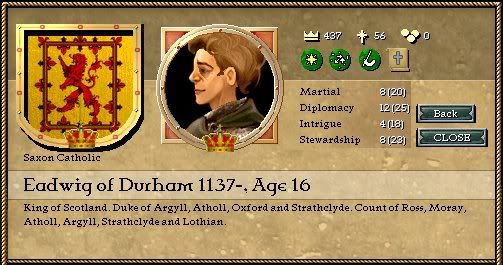
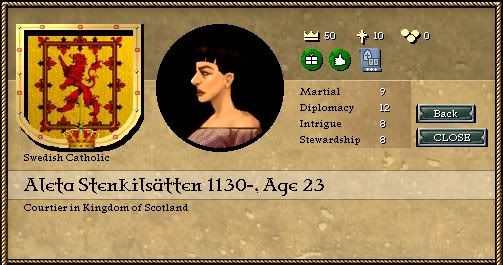
Aleta stirred and turned in his embrace to face her young husband, running her slender fingers through his flaxen curls. ‘My little King…’ she smiled sleepily.
Eadwig, though he’d been hearing that title ever since he was eight, had never been gladder to hear himself called King. ‘My bonny Aleta,’ he responded. ‘We’ve got important things to do today. We shall have to have a feast prepared, undoubtedly, as my grandda the Duke of Berwick is riding up to visit his new in-law.’ His voice grew sullen and his face clouded over even as he said it. No thought of his grandfather could ever be a pleasant one.
‘Your grandda?’ asked Aleta. ‘Are you and he not on good terms?’
‘He’s family,’ Eadwig shrugged. ‘Why would we be on bad terms?’
Aleta simply gave him a steady, patient look. Eadwig finally gave in and asked her, ‘Do you remember what happened to my other grandfather, Eochaid (God rest him)?’
‘He died of poison,’ Aleta answered. ‘I remember it was a very suspicious death, and rather weighty news in Jylland. People tend to notice when one of the most powerful kings in northern Europe keels over dead.’
‘Grandda was behind it,’ Eadwig muttered darkly. ‘I know Grandda was behind it – who else stood to gain anything? And who else had the ambition and the gall to murder his liege? Did he think I’d be grateful, or just too young to realise what happened? Just like Mac Bethad mac Findláech, the entire affair of my succession was stained with blood. How can I go about proving my worth as King with that burden?’
‘I… see,’ Aleta replied solemnly. ‘But what other men have done can’t be helped. When you go to confession, does your priest ask you what it is your father did yesterday that you must confess?’
Eadwig’s face lightened just a little, and Aleta held him even tighter.
‘Even if a bloody deed did place the crown on your head, no blood has stained your hands, my King. You can still be a virtuous and brave ruler, grandfather or no grandfather. And I will always be there at your side,’ she comforted him, his head against her shoulder.
And now Eadwig remembered why he had married her. Though she was both beautiful and accomplished, it had not been either her beauty or her skill which had attracted him to her. He’d been taken with the openness and generosity of spirit which she was even now displaying for him. Nothing then could have given him more comfort than the fact that she was at his side.
Eadwig gave a laugh as he lay nestled up with her. ‘I was thinking it was quite ironic… couple weeks ago the news came up. The Cardinals down in Rome were so impressed with the “piety” of my Grandda and his bishops that they decided to elect this Pope from among his clerical retinue. And they couldn’t have been unaware of this scandal!’
‘What was this cleric’s name?’
‘Oh, it was something Swedish… Valdemar, I think it was… but he’s now known as Pope Damasus III. I think I may even have met the man once: bald little fellow, grizzled beard. And there’s been some talk that one of the first things he’ll do from St. Peter’s throne is to excommunicate Talal King of England.’
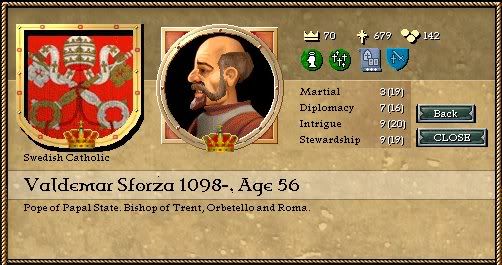
‘I can hardly say I’m surprised,’ Aleta commented sagely. ‘Your grandfather’s had his eye on the English Crown for some time now, hasn’t he? And Talal doesn’t exactly have the reputation to keep him in good odour with the Church. So now that the Duke of Berwick has Pope Damasus’ ear, of course the English Crown will be made a target. But I suppose you and I should be up and dressed, Eadwig. It sounds like today is likely to be a very busy day.’
X. The Saxon King of the Scots
Eadwig of Durham, King of the Scots, awoke in the nuptial chamber of Dùn Chailleann manor that chilly September morning in the Year of our Lord 1153, holding his bride Aleta Astradsdotter. Even as she slept soundly in his arms, Aleta managed to thrill him with her mature, dark beauty. Many of his advisors, especially his aunt Alice, had been against the match, telling him Aleta was far too old for him at twenty-three years. But the young king never gave the matter a second thought. Eadwig of Durham did tend to do many things on impulse, only to regret them afterwards, but lying together with Aleta like this… he couldn’t think marrying her would ever be numbered among his regrets, however small.


Aleta stirred and turned in his embrace to face her young husband, running her slender fingers through his flaxen curls. ‘My little King…’ she smiled sleepily.
Eadwig, though he’d been hearing that title ever since he was eight, had never been gladder to hear himself called King. ‘My bonny Aleta,’ he responded. ‘We’ve got important things to do today. We shall have to have a feast prepared, undoubtedly, as my grandda the Duke of Berwick is riding up to visit his new in-law.’ His voice grew sullen and his face clouded over even as he said it. No thought of his grandfather could ever be a pleasant one.
‘Your grandda?’ asked Aleta. ‘Are you and he not on good terms?’
‘He’s family,’ Eadwig shrugged. ‘Why would we be on bad terms?’
Aleta simply gave him a steady, patient look. Eadwig finally gave in and asked her, ‘Do you remember what happened to my other grandfather, Eochaid (God rest him)?’
‘He died of poison,’ Aleta answered. ‘I remember it was a very suspicious death, and rather weighty news in Jylland. People tend to notice when one of the most powerful kings in northern Europe keels over dead.’
‘Grandda was behind it,’ Eadwig muttered darkly. ‘I know Grandda was behind it – who else stood to gain anything? And who else had the ambition and the gall to murder his liege? Did he think I’d be grateful, or just too young to realise what happened? Just like Mac Bethad mac Findláech, the entire affair of my succession was stained with blood. How can I go about proving my worth as King with that burden?’
‘I… see,’ Aleta replied solemnly. ‘But what other men have done can’t be helped. When you go to confession, does your priest ask you what it is your father did yesterday that you must confess?’
Eadwig’s face lightened just a little, and Aleta held him even tighter.
‘Even if a bloody deed did place the crown on your head, no blood has stained your hands, my King. You can still be a virtuous and brave ruler, grandfather or no grandfather. And I will always be there at your side,’ she comforted him, his head against her shoulder.
And now Eadwig remembered why he had married her. Though she was both beautiful and accomplished, it had not been either her beauty or her skill which had attracted him to her. He’d been taken with the openness and generosity of spirit which she was even now displaying for him. Nothing then could have given him more comfort than the fact that she was at his side.
Eadwig gave a laugh as he lay nestled up with her. ‘I was thinking it was quite ironic… couple weeks ago the news came up. The Cardinals down in Rome were so impressed with the “piety” of my Grandda and his bishops that they decided to elect this Pope from among his clerical retinue. And they couldn’t have been unaware of this scandal!’
‘What was this cleric’s name?’
‘Oh, it was something Swedish… Valdemar, I think it was… but he’s now known as Pope Damasus III. I think I may even have met the man once: bald little fellow, grizzled beard. And there’s been some talk that one of the first things he’ll do from St. Peter’s throne is to excommunicate Talal King of England.’

‘I can hardly say I’m surprised,’ Aleta commented sagely. ‘Your grandfather’s had his eye on the English Crown for some time now, hasn’t he? And Talal doesn’t exactly have the reputation to keep him in good odour with the Church. So now that the Duke of Berwick has Pope Damasus’ ear, of course the English Crown will be made a target. But I suppose you and I should be up and dressed, Eadwig. It sounds like today is likely to be a very busy day.’
Last edited:
Not the everyday sort of pillow talk! But then not everyone is King of Scotland either. Interesting.
XI. Fallen Hero
Aethelfrith Duke of Lancaster placed his head in his hand, as though a mighty headache had come over him. ‘How… how did it happen?’
Wulfhere Percy had a grim look on his gaunt, pale face as he bore the news. ‘He was struck down in battle by none other than the Persian general himself, Tahmasb al-Kasran, in the battle of Guilan. He lived his life by the sword, did his Majesty your father, and it seems fitting that he should die such a noble death in holy battle against the heathen.’
‘Yes…’ Aethelfrith murmured. ‘He always did live to hear the clash of steel; it’s no wonder it took a general to defeat him. It’s a pity he didn’t live to see England reunited at last.’
The last years had seen the heretic Talal ousted by Saewald Duke of Berwick, thereafter Saewald I, King of England. But Saewald found himself disliked by many of his vassals: they saw him as an opportunist and a despot. But the English nobles did not understand Saewald as his son did: Saewald truly did want to see a united England, but at the same time his valour and his ambition would not allow him to be defeated by another, less powerful lord.
At the same time, Saewald was no fool. He realised that if he continued warring with other Christian powers, he would lose his grasp on those lands he’d already won for his family. And so, the elderly King of England eased the burning of his martial heart the only way he knew how. He went on Crusade.
His predecessor, Talal, had landed control of several provinces in the Orient, including Shahreza. Saewald made his journey there and invaded northward, further into the Persian heartland. He’d conquered most of the southern Persian coast and all the way up into Qazvin and Lorestan. And he had made his way up the Caspian’s shores in the province of Guilan to do battle with the Emir of Derbent.
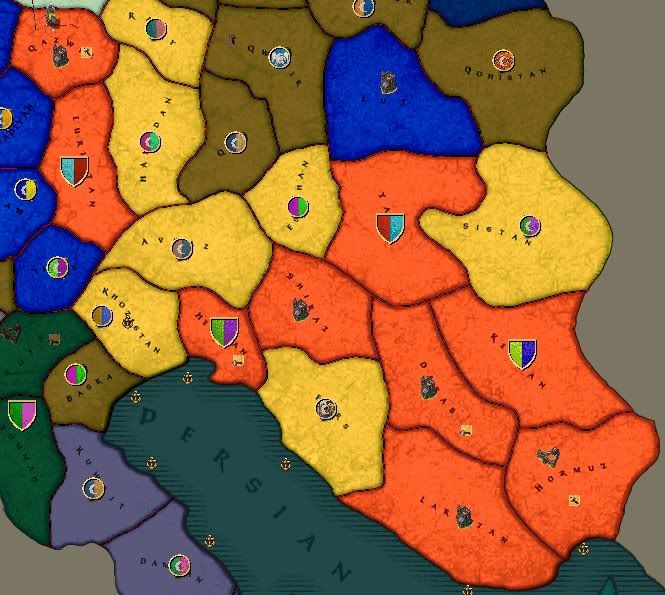
It had been, or so Aethelfrith had received word, an even battle: the Emir’s forces and the King’s each numbering about thirty-five hundred, in a field outside the Castle Rudkhan. Early on, the battle had swung in Saewald’s favour, and if not for a chance skirmish between Saewald’s guard and General Tahmasb’s unit, Saewald would certainly have lived to reach Abshuran.
‘The Emir’s general smote him down, cutting deep into his shoulder and nearly severing his arm,’ Wulfhere reported. ‘At least, such was the report from Ceolred. But Saewald had kept fighting like the old lion he is, until he’d bled so much he could no longer stand. By that time, he was taken off the field by a loyal foot-soldier and had a Persian leech attend to him. The Persian physicians, they say, know far more than any we have here, but even their advanced arts could do no more for our King. No sooner had news of his army’s victory reached his ears but he breathed his last.
‘Ceolred’s army is standing in Guilan,’ Wulfhere concluded. ‘England’s armies await only your command… my King.’
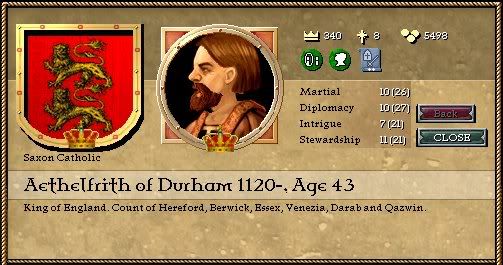
Aethelfrith stepped into the title as easily and naturally as though it had been his since birth. ‘Very well,’ he told Wulfhere. ‘Let us finish what my father started! Let us make the Saracens realise that our blood cannot be bought cheaply! Tell Ceolred to march his troops directly upon Derbent, and to take the Emir’s lands for our family and for our faith!’
Wulfhere bowed deeply. ‘I shall send out a messenger at once, your Majesty.’
---------------------
And also, for interest's sake, a look at England's reach in 1158:
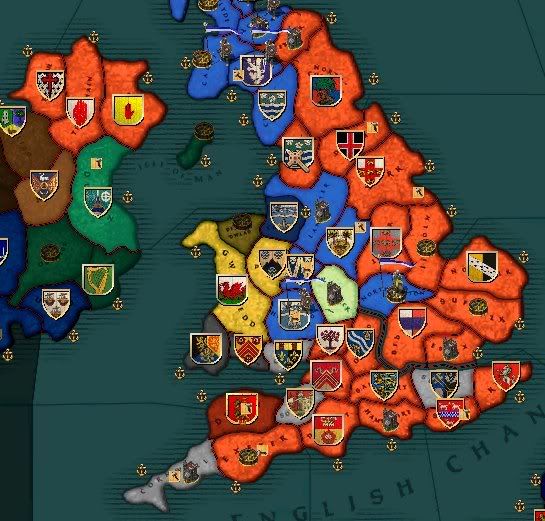
And 1163:
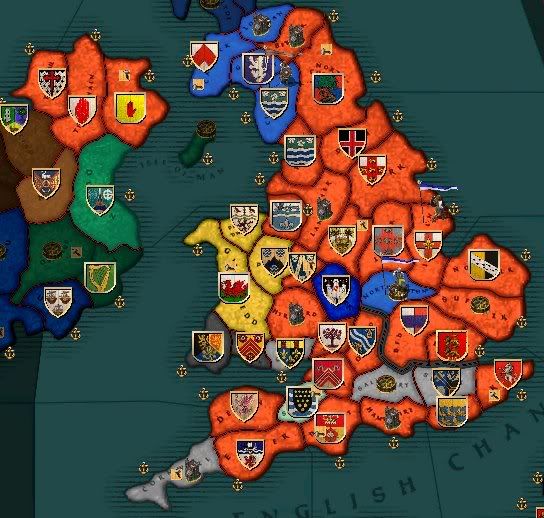
Aethelfrith Duke of Lancaster placed his head in his hand, as though a mighty headache had come over him. ‘How… how did it happen?’
Wulfhere Percy had a grim look on his gaunt, pale face as he bore the news. ‘He was struck down in battle by none other than the Persian general himself, Tahmasb al-Kasran, in the battle of Guilan. He lived his life by the sword, did his Majesty your father, and it seems fitting that he should die such a noble death in holy battle against the heathen.’
‘Yes…’ Aethelfrith murmured. ‘He always did live to hear the clash of steel; it’s no wonder it took a general to defeat him. It’s a pity he didn’t live to see England reunited at last.’
The last years had seen the heretic Talal ousted by Saewald Duke of Berwick, thereafter Saewald I, King of England. But Saewald found himself disliked by many of his vassals: they saw him as an opportunist and a despot. But the English nobles did not understand Saewald as his son did: Saewald truly did want to see a united England, but at the same time his valour and his ambition would not allow him to be defeated by another, less powerful lord.
At the same time, Saewald was no fool. He realised that if he continued warring with other Christian powers, he would lose his grasp on those lands he’d already won for his family. And so, the elderly King of England eased the burning of his martial heart the only way he knew how. He went on Crusade.
His predecessor, Talal, had landed control of several provinces in the Orient, including Shahreza. Saewald made his journey there and invaded northward, further into the Persian heartland. He’d conquered most of the southern Persian coast and all the way up into Qazvin and Lorestan. And he had made his way up the Caspian’s shores in the province of Guilan to do battle with the Emir of Derbent.

It had been, or so Aethelfrith had received word, an even battle: the Emir’s forces and the King’s each numbering about thirty-five hundred, in a field outside the Castle Rudkhan. Early on, the battle had swung in Saewald’s favour, and if not for a chance skirmish between Saewald’s guard and General Tahmasb’s unit, Saewald would certainly have lived to reach Abshuran.
‘The Emir’s general smote him down, cutting deep into his shoulder and nearly severing his arm,’ Wulfhere reported. ‘At least, such was the report from Ceolred. But Saewald had kept fighting like the old lion he is, until he’d bled so much he could no longer stand. By that time, he was taken off the field by a loyal foot-soldier and had a Persian leech attend to him. The Persian physicians, they say, know far more than any we have here, but even their advanced arts could do no more for our King. No sooner had news of his army’s victory reached his ears but he breathed his last.
‘Ceolred’s army is standing in Guilan,’ Wulfhere concluded. ‘England’s armies await only your command… my King.’

Aethelfrith stepped into the title as easily and naturally as though it had been his since birth. ‘Very well,’ he told Wulfhere. ‘Let us finish what my father started! Let us make the Saracens realise that our blood cannot be bought cheaply! Tell Ceolred to march his troops directly upon Derbent, and to take the Emir’s lands for our family and for our faith!’
Wulfhere bowed deeply. ‘I shall send out a messenger at once, your Majesty.’
---------------------
And also, for interest's sake, a look at England's reach in 1158:

And 1163:

Last edited:
Crusading appears to be something of a family tradition. Nice to see it being maintained.
XII. A Crusader’s Twilight
Aethelfrith sighed as he leaned back in his chair in his room, and looked out upon the city of London. He was battered, bleeding and weary, having fought at the forefront of his troops in rural Essex to quell a peasants’ revolt. His vassals had complimented him on his martial prowess and the bravery he had displayed fighting in the thick of things, but he found the clashing of swords ringing in his ears a bitter sound now. The very dukes who had so ungraciously despised him for being arrogant and vain now hailed him as a hero for beating back a few peasants just outside his own capital. He laughed as he thought on the whimsical humour of God’s will.
The early years of Aethelfrith’s reign as King of England had been very rough, with intermittent Crusades troubling his realm. The Emirate of Derbent was easily defeated, but the de Normandie family was completely wiped out by North African Saracens who landed on English soil and conquered Cornwall and Salisbury. This was something for which the King of England could not stand, and he took both Cornwall and Salisbury in a quick and relatively painless war. But the Highland Crusades were another matter. His own valiant and brave son had embroiled his kingdom in a war with the Emir of Tripoli, and Saracens from the Holy Land had come by sea to make war on Scotland. They had gotten all the way into Atholl before Scotland’s more militarily-capable father had put a stop to them. And then Eadwig had gone into a deep depression and died, leaving his realm to his son Eardulf and his young wife Candida. Saewald I’s hopes of a united Kingdom of England and Scotland had been in vain; the English crown would go to the younger of his sons, Eormenric, and then to his grandson, Hlothere Earl of Cornwall.
The Emir of Tripoli, of course, was the primary target of the grand Crusade to free Antioch, and it had shamed both England and Scotland that they’d had to go to war on their home front to defend against them. Antioch had been captured by the Bohemians, who had set up their own little earldom there. Now the Pope’s war was over, and they could attend to their domestic affairs.
Things should then have gone back to normal, but the new Earl of Strathclyde was evidently unsatisfied with the station which Aethelfrith had so generously bestowed upon his unworthy head, and decided to make war on England. It was Duke Lancaster who had carried the full brunt of that one, and a Lancastrian bishop of mixed Saxon and Arab blood now herded his flocks in Strathclyde. Personally, Aethelfrith was not too satisfied with Duke Lancaster’s choice, having seen the distrustful, calculating look in Bishop Alim’s eye, but Lancaster was one of his most trusted nobles and Aethelfrith would not gainsay him.
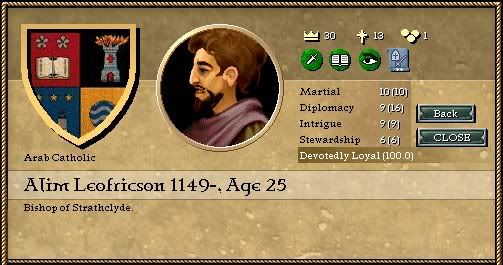
Aethelfrith was loath to admit it, but he was getting far too old for this sort of thing. He had fought in countless battles, seen many good men lost in the thick of it all, felt the sting of enemy steel and smelled the heat of the blood and smoke. He had tasted victory and for a time, he had revelled in its flavour. But now, his fire had dimmed and his steel had dulled – he no longer desired to wade onto the battlefield. He would leave his wars to his sons.
Aethelflaed came in upon him as he rested and changed the dressings on his wounds. He brushed his young wife’s fair, long hair with one tired old hand, and she smiled curtly and sat beside him.
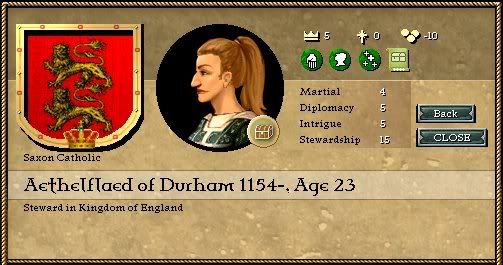
‘I hear you fought bravely out on the Thames,’ she told him, in her brusque, concise manner.
Aethelfrith gave a wry half-grin. ‘So have I. I should have thought I’d never get tired of being hailed “Aethelfrith King, the Valiant”, but I find I’m hearing it a little too often for my taste.’
‘Well, don’t consider it praise on my part, your Majesty,’ Aethelflaed chided him. ‘A King out on the front lines and in the thick of battle, it’s not your place. And what would I have done had you gotten yourself killed?’
Aethelfrith chuckled. Aethelflaed had always been sure in her judgments and quick and free with her tongue, which had once struck out against her king and uncle in his very presence. Aethelfrith, far from being offended, had been impressed by how freely she’d criticised him for his vanity and pride. He’d married his great-niece against the wishes of his family and against the wishes of the church, partly out of need and partly out of whimsy. She already took care of his financial matters, and he had needed a companion then more than ever before.
‘Aubry de Bohun has returned from the East, and wishes to speak with you. I think he thinks to secure a marriage between his daughter Golbahar and your grandson, Hlothere.’
‘Have you seen the girl?’ asked Aethelfrith. Aethelflaed nodded.
‘You know Aubry married one of the converts in Yasuj, Mahvash? His daughter takes after her mother in not only her looks. She dresses in the Oriental manner and prefers to speak Persian when she mustn’t use her French. But she’s a sharp, lively girl – I would say she’s a dark beauty’ – rare praise from his wife – ‘of a generally agreeable temper. She is a bit excitable, but as your grandson and she have already been introduced I’d say there’s little problem.’
Aethelfrith trusted Aethelflaed’s assessment of Golbahar, but he knew Aubry for an ambitious man and masterful politician, though quite a dangerous one if crossed. ‘Give him no answer yet, Aethelflaed. But tell him I will talk with him about it as soon as I am healed.’
-------
A glimpse of Persia in 1180 - the red is England, the gold is the Seljuqs, and the blue and green are splinter emirates from the Seljuq King. (As you can see, the Seljuqs aren't doing too well in my game.)
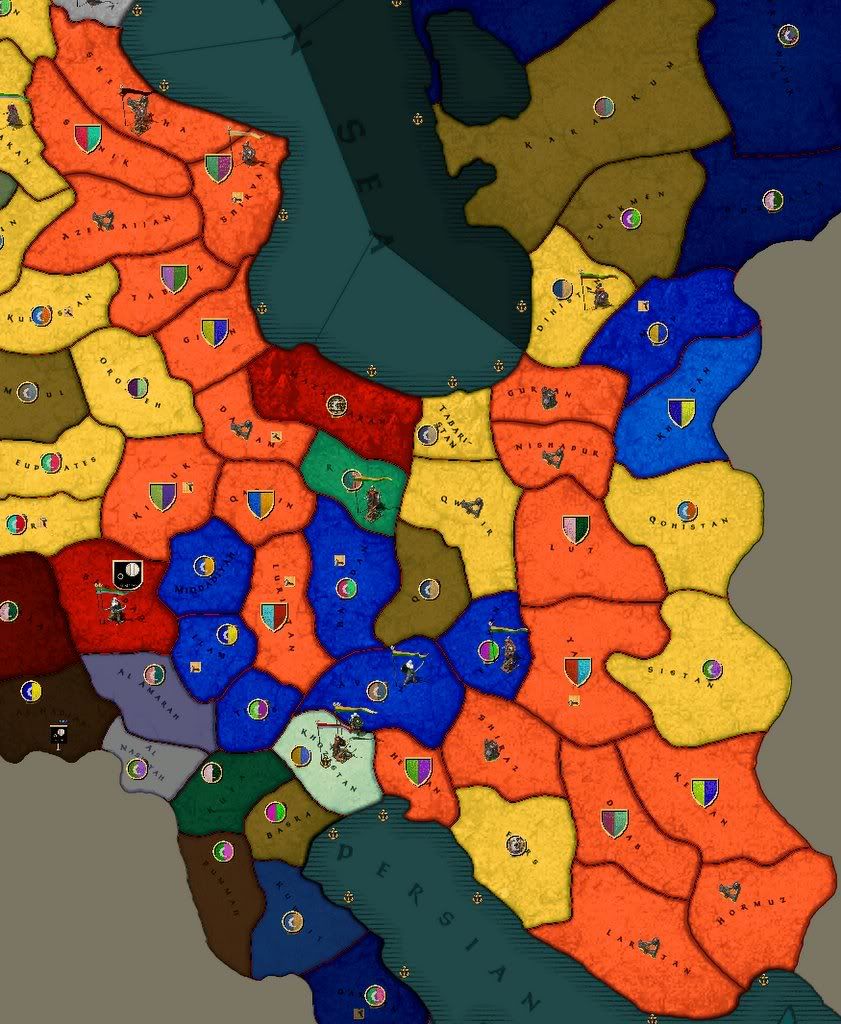
Aethelfrith sighed as he leaned back in his chair in his room, and looked out upon the city of London. He was battered, bleeding and weary, having fought at the forefront of his troops in rural Essex to quell a peasants’ revolt. His vassals had complimented him on his martial prowess and the bravery he had displayed fighting in the thick of things, but he found the clashing of swords ringing in his ears a bitter sound now. The very dukes who had so ungraciously despised him for being arrogant and vain now hailed him as a hero for beating back a few peasants just outside his own capital. He laughed as he thought on the whimsical humour of God’s will.
The early years of Aethelfrith’s reign as King of England had been very rough, with intermittent Crusades troubling his realm. The Emirate of Derbent was easily defeated, but the de Normandie family was completely wiped out by North African Saracens who landed on English soil and conquered Cornwall and Salisbury. This was something for which the King of England could not stand, and he took both Cornwall and Salisbury in a quick and relatively painless war. But the Highland Crusades were another matter. His own valiant and brave son had embroiled his kingdom in a war with the Emir of Tripoli, and Saracens from the Holy Land had come by sea to make war on Scotland. They had gotten all the way into Atholl before Scotland’s more militarily-capable father had put a stop to them. And then Eadwig had gone into a deep depression and died, leaving his realm to his son Eardulf and his young wife Candida. Saewald I’s hopes of a united Kingdom of England and Scotland had been in vain; the English crown would go to the younger of his sons, Eormenric, and then to his grandson, Hlothere Earl of Cornwall.
The Emir of Tripoli, of course, was the primary target of the grand Crusade to free Antioch, and it had shamed both England and Scotland that they’d had to go to war on their home front to defend against them. Antioch had been captured by the Bohemians, who had set up their own little earldom there. Now the Pope’s war was over, and they could attend to their domestic affairs.
Things should then have gone back to normal, but the new Earl of Strathclyde was evidently unsatisfied with the station which Aethelfrith had so generously bestowed upon his unworthy head, and decided to make war on England. It was Duke Lancaster who had carried the full brunt of that one, and a Lancastrian bishop of mixed Saxon and Arab blood now herded his flocks in Strathclyde. Personally, Aethelfrith was not too satisfied with Duke Lancaster’s choice, having seen the distrustful, calculating look in Bishop Alim’s eye, but Lancaster was one of his most trusted nobles and Aethelfrith would not gainsay him.

Aethelfrith was loath to admit it, but he was getting far too old for this sort of thing. He had fought in countless battles, seen many good men lost in the thick of it all, felt the sting of enemy steel and smelled the heat of the blood and smoke. He had tasted victory and for a time, he had revelled in its flavour. But now, his fire had dimmed and his steel had dulled – he no longer desired to wade onto the battlefield. He would leave his wars to his sons.
Aethelflaed came in upon him as he rested and changed the dressings on his wounds. He brushed his young wife’s fair, long hair with one tired old hand, and she smiled curtly and sat beside him.

‘I hear you fought bravely out on the Thames,’ she told him, in her brusque, concise manner.
Aethelfrith gave a wry half-grin. ‘So have I. I should have thought I’d never get tired of being hailed “Aethelfrith King, the Valiant”, but I find I’m hearing it a little too often for my taste.’
‘Well, don’t consider it praise on my part, your Majesty,’ Aethelflaed chided him. ‘A King out on the front lines and in the thick of battle, it’s not your place. And what would I have done had you gotten yourself killed?’
Aethelfrith chuckled. Aethelflaed had always been sure in her judgments and quick and free with her tongue, which had once struck out against her king and uncle in his very presence. Aethelfrith, far from being offended, had been impressed by how freely she’d criticised him for his vanity and pride. He’d married his great-niece against the wishes of his family and against the wishes of the church, partly out of need and partly out of whimsy. She already took care of his financial matters, and he had needed a companion then more than ever before.
‘Aubry de Bohun has returned from the East, and wishes to speak with you. I think he thinks to secure a marriage between his daughter Golbahar and your grandson, Hlothere.’
‘Have you seen the girl?’ asked Aethelfrith. Aethelflaed nodded.
‘You know Aubry married one of the converts in Yasuj, Mahvash? His daughter takes after her mother in not only her looks. She dresses in the Oriental manner and prefers to speak Persian when she mustn’t use her French. But she’s a sharp, lively girl – I would say she’s a dark beauty’ – rare praise from his wife – ‘of a generally agreeable temper. She is a bit excitable, but as your grandson and she have already been introduced I’d say there’s little problem.’
Aethelfrith trusted Aethelflaed’s assessment of Golbahar, but he knew Aubry for an ambitious man and masterful politician, though quite a dangerous one if crossed. ‘Give him no answer yet, Aethelflaed. But tell him I will talk with him about it as soon as I am healed.’
-------
A glimpse of Persia in 1180 - the red is England, the gold is the Seljuqs, and the blue and green are splinter emirates from the Seljuq King. (As you can see, the Seljuqs aren't doing too well in my game.)

Last edited:

